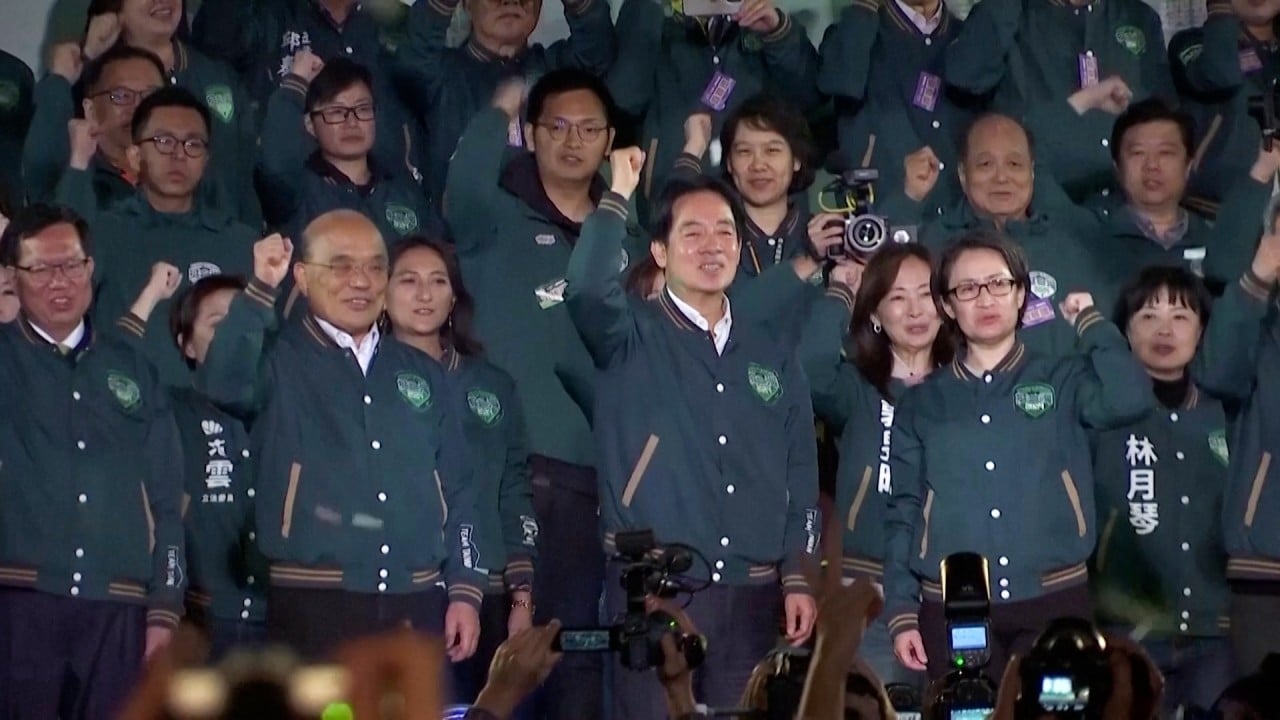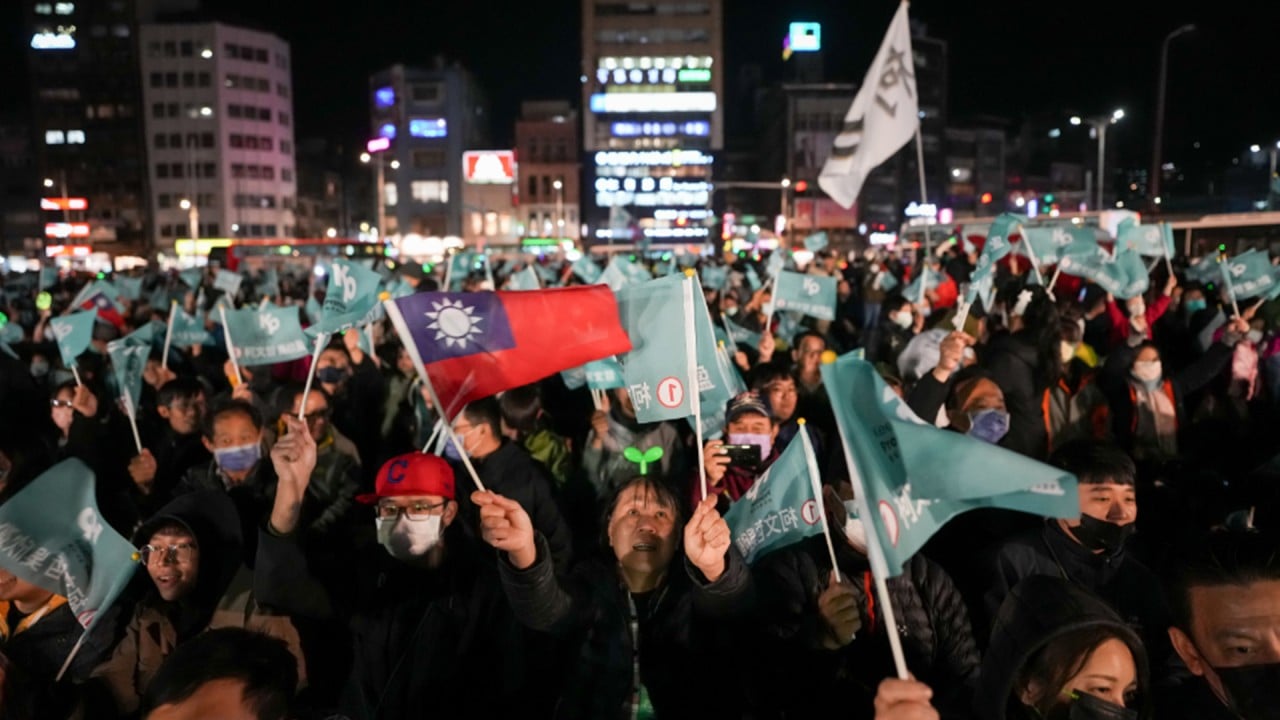
Fresh faces for Taiwan’s next cabinet but security left to old hands who know Beijing’s ‘bottom line’
- Profile of William Lai Ching-te’s ministerial team is expected to show Lai has no desire to alter cross-strait status quo: analysts
- Observers say new cabinet expected to put further weight on ties with the US as Lai, like Tsai Ing-wen, must rely on Washington to counter Beijing
The new cabinet – which will assume office after Lai is inaugurated next month – features old faces familiar with the policy of outgoing President Tsai Ing-wen in handling the complex relationships with Beijing and Washington, they said.
Lai, of the independence-leaning Democratic Progressive Party, was elected president in January. He will succeed Tsai, also of the DPP, who is to end her second four-year term on May 20.

On April 10, Lai named his confidant, Cho Jung-tai, former DPP chairman and ex-cabinet secretary general, as premier.
Under the island’s political system, the president selects the premier, who then appoints cabinet members with final approval from the president. The cabinet then executes the president’s policies and proposes legislation.
Other appointments include interior minister Liu Shih-fang, justice minister Cheng Ming-chien, transport minister Li Meng-yen, culture minister Li Yuan, and education minister Cheng Ying-yao.
Foreign Minister Joseph Wu will return to the position of secretary general of the National Security Council, which he held from 2016 to 2017. Presidential secretary general Lin Chia-lung, former transport minister and Taichung mayor, will take over from Wu as foreign minister.
Tsai revealed the appointment of Wu and Lin when she introduced them during a meeting with lawmakers from New Zealand on Tuesday.
Meanwhile, Wellington Koo, secretary general of the NSC, is expected to be appointed defence minister. Tsai Ming-yen, who took over as head of the National Security Bureau in 2023, is expected to retain his position.
Deputy secretary general of the semi-official Straits Exchange Foundation Chiu Chui-cheng, a former vice-minister of the Mainland Affairs Council known for his non-hawkish stand, is tipped to head the MAC, which charts cross-strait policy, according to news reports.
Analysts said that except for the appointment of heads of the economic and financial team – who are mostly new faces – most cabinet members, especially those with the national security team, are familiar political figures.
“What Lai is doing is rotating the positions of some of the incumbents from the national security team so that the same group of people can continue to work in this team,” said Huang Kwei-bo, a professor of diplomacy at National Chengchi University in Taipei.
In Taiwan, the cabinet’s national security team includes the heads of its foreign, mainland, defence and security affairs portfolios.
“Lai means to tell others, especially the United States, that the new cabinet will follow Tsai [Ing-wen’s] policy and will not do anything surprising,” Huang said.
Lai identified himself as a “pragmatic worker for Taiwan independence” when he was premier under Tsai’s administration in 2017. The identification triggered concern from the United States that he might declare an official split with the mainland if elected president.
Taiwan semiconductor veteran named as economy minister
During his run-up to the presidency, Lai – who has been denounced by Beijing as a “troublemaker” and “obstinate separatist” – watered down his previous claim, saying he had no “independence road map”, and vowing he would continue Tsai’s policy if elected.
Beijing sees Taiwan as part of its territory awaiting reunification, by force if necessary. Most countries, including the US, do not recognise Taiwan as an independent state but oppose any attempt to take it by force.
Shortly after Lai was elected in January, the US sent top envoy Laura Rosenberger to Taiwan on a visit seen as to better understand Lai’s plans for office. On March 31, Rosenberger again visited the island, reportedly to get a better understanding of what Lai might say during his inauguration.
Analysts said the new cabinet was expected to put further weight on ties with the US as Lai, like Tsai, needed to rely on Washington to counter Beijing.
“Vice-president-elect Hsiao Bi-khim should be the person in charge of relations with the US and other non-allies,” Huang said, noting the diplomatic links Hsiao forged when she was the island’s de facto ambassador to the US.
Li Da-jung, a professor of international relations and strategic studies at Tamkang University in New Taipei, said all of the incumbents, including Wu, Koo, Tsai Ming-yen and Chiu, were familiar with relations with the US and knew where the bottom line with Beijing would be when it came to cross-strait stand-off.
“Koo and Wu are old hands in terms of security, international and cross-strait affairs, and they know well how to continue Tsai Ing-wen’s policy,” Li said. Wu had headed the MAC between 2004 and 2007, and was the island’s de facto ambassador to the US in 2007-08.
Li said that although foreign affairs was not Lin Chia-lung’s main area of expertise, and his appointment as foreign minister was somewhat the result of a “post-election back room deal or pork barrel”, his job as the presidential secretary general allowed him to understand Tsai’s national security policy better.
Wang Kung-yi, head of the Taiwan International Strategic Study Society think tank, said that by keeping those officials on the national security team, Lai was signalling that there would be no change and no surprises in his cross-strait, US and foreign policies – at least in his first year in office.
“It is thus necessary for him to make clear … during his inaugural speech on May 20 that he would not seek to change the cross-strait status quo, and that Taiwan would continue to play the role of a responsible stakeholder in the region,” Wang said.
On the appointment of Cho as the premier, Wang said Lai was playing it safe as the former DPP chairman was known for his relatively moderate stand and was skilled in the communication and coordination of differences between rival camps.

“The incoming Lai government is a minority government, not only because Lai was only able to garner 40 per cent of the vote in the election, but also because his DPP failed to retain its majority in the legislature,” Wang said.
“This will make his administration more difficult than that of Tsai as his policy, especially the cross-strait one, could be vetoed or boycotted by the opposition in the legislature, and the mediator role of Cho thus becomes important in the legislature.”



